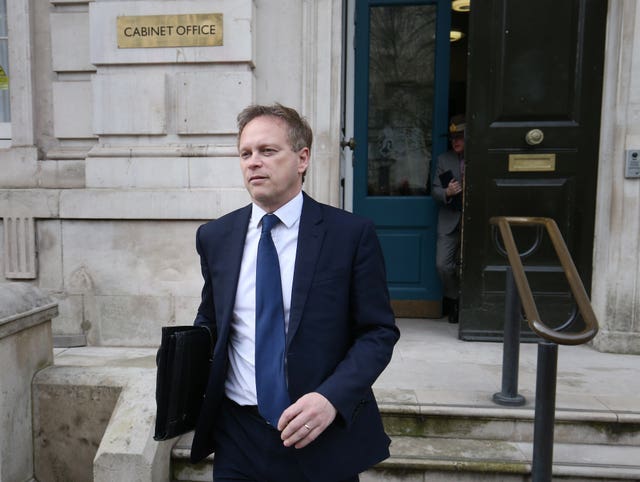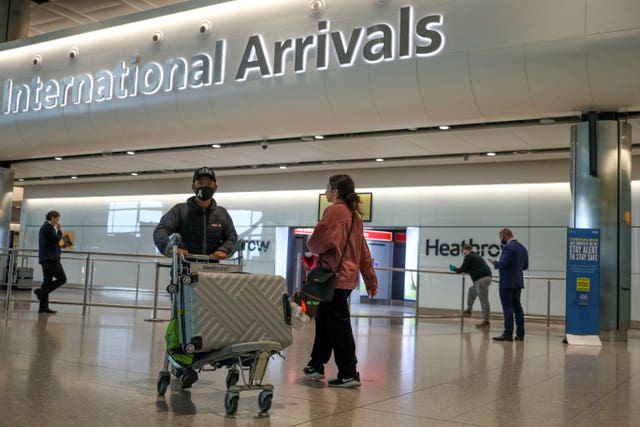Consumer rights and travel groups have criticised the Government after it moved suddenly to re-impose quarantine restrictions on those returning from Spain.
Ministers announced on Saturday that holidaymakers who had not returned from Spain and its islands by midnight would be forced to quarantine for 14 days after Covid-19 second wave fears saw the European country struck off the UK’s safe list.
But questions have been asked about why the so-called “travel corridor” with the UK’s most popular holiday destination was suspended with little notice, with the sudden turn of events catching out even Transport Secretary Grant Shapps, who is currently in Spain for his summer break.
READ MORE: Travellers returning to Scotland from Spain required to quarantine
According to The Sunday Times, Mr Shapps, whose department formally announced the rule change, had to dial in from Spain to discuss altering the guidance with Health Secretary Matt Hancock and Cabinet Office minister Michael Gove.
In Scotland, Spain had only last week been added to its safe list of countries before Saturday evening’s dramatic U-turn.
Northern Ireland and Wales have also followed suit in suspending the travel corridor.
London-based World Travel & Tourism Council (WTTC) said the decision to remove Spain from the travel corridor exemption list was “disastrous” for the travel and tourism industry, both in Spain and the UK.
Gloria Guevara, WTTC president and chief executive, said: “While the health and safety of travellers – as well as those who work within the travel and tourism industry – is paramount, this move will be a bitter blow for those holidaymakers already in Spain who will now be forced into isolation when they return home.
Rory Boland, editor of consumer rights magazine Which? Travel, said: “Many holidaymakers will be deeply angry that the Government didn’t make this decision 48 hours ago, before tens of thousands of them flew off for their summer holidays in Spain.
“Many would not have travelled if they had known they’d face 14 days of quarantine on their return.”
 Transport Secretary Grant Shapps flew to Spain for his holiday on Saturday morning (Jonathan Brady/PA)
Transport Secretary Grant Shapps flew to Spain for his holiday on Saturday morning (Jonathan Brady/PA)
Tui, the UK’s biggest tour operator, said it had cancelled all flights due to depart to mainland Spain and the Canary Islands on Sunday.
Managing director Andrew Flintham confirmed the company would contact customers to arrange refunds or rebookings, but added: “We’re incredibly disappointed that we didn’t get more notice of this announcement, or that this decision wasn’t made yesterday, as many Brits travel on holiday at the weekend.”
But Government sources said the “fast moving picture” regarding Spain’s coronavirus cases meant ministers had to act “immediately”.
A UK Government spokesman said: “The Joint Biosecurity Centre together with Public Health England have updated their coronavirus assessments of Spain based on the latest data.
READ MORE: UK adds Spain to quarantine list: What does this mean for holidaymakers?
“As a result, Spain has been removed from the lists of countries from which passengers arriving in England, Scotland, Wales and Northern Ireland are exempted from the need to self-isolate.
“Protecting public health is our absolute priority and we have taken this decision to limit any potential spread to the UK.
“We’ve always been clear that we would act immediately to remove a country where necessary.”
The reintroduction of quarantine measures will apply to those returning from mainland Spain, the Canary Islands and the Balearic Islands, such as Mallorca and Ibiza, the Department for Transport (DfT) confirmed.
The Foreign Office is now advising against all but essential travel to mainland Spain.
Labour’s shadow home secretary Nick Thomas-Symonds said the news would be “deeply concerning for families” currently in Spain or who were planning a trip, and called for ministers to release details explaining how people affected would be supported.
Employers are being urged by the DfT to be “understanding of those returning from Spain who now will need to self-isolate” following the sudden advice change.
But the move is likely to cast doubt on thousands of holiday plans as would-be jet setters weigh up the risk of travelling to Spain and the requirement to stay home for two weeks upon arriving back in Britain.
 Passengers returning to England from holidays in Spain are set to be asked to quarantine (Steve Parsons/PA)
Passengers returning to England from holidays in Spain are set to be asked to quarantine (Steve Parsons/PA)
Neil Hunter, 45, from Sittingbourne in Kent, booked a 10-day break to Lanzarote last December.
Due to leave on Tuesday, he told the PA news agency: “We were going as a family, my wife Amanda, and teenage daughter Bethany but to be honest, since this announcement, I’m unsure what’s going to happen as I work as a train driver, and I don’t think my employer will accept me having to isolate due to going on holiday.”
Authorities in Spain warned the country that lost 28,000 lives before getting its outbreak under control could be facing the start of a second major outbreak.
On Thursday, the Spanish health ministry reported 971 new daily infections, the biggest daily increase since Spain’s lockdown ended.
Catalonia became the latest region to crack down on nightlife, trying to halt new infection clusters.
 The Catalonia regional government has shut nightlife venues in Barcelona, and on Friday officials in Madrid said they were considering a similar step (Manu Fernandez/AP)
The Catalonia regional government has shut nightlife venues in Barcelona, and on Friday officials in Madrid said they were considering a similar step (Manu Fernandez/AP)
The wealthy north-east region – home to Barcelona – ordered all nightclubs to close for 15 days and put a midnight curfew on bars in the greater Barcelona area and other towns around Lleida that have become contagion hot zones.
The quarantine imposition came as PHE, which was involved in the Spain decision, found itself under-fire from senior Tories for its failure to own up to leadership mistakes during the handling of the pandemic, according to a Sunday Telegraph report.
The paper claimed the Government was considering a “radical overhaul” of the health body after chief executive Duncan Selbie, during an appearance in front of PHE’s advisory board last week, was said to have defended the decision to stop contact tracing during the Covid-19 peak.


Why are you making commenting on The Herald only available to subscribers?
It should have been a safe space for informed debate, somewhere for readers to discuss issues around the biggest stories of the day, but all too often the below the line comments on most websites have become bogged down by off-topic discussions and abuse.
heraldscotland.com is tackling this problem by allowing only subscribers to comment.
We are doing this to improve the experience for our loyal readers and we believe it will reduce the ability of trolls and troublemakers, who occasionally find their way onto our site, to abuse our journalists and readers. We also hope it will help the comments section fulfil its promise as a part of Scotland's conversation with itself.
We are lucky at The Herald. We are read by an informed, educated readership who can add their knowledge and insights to our stories.
That is invaluable.
We are making the subscriber-only change to support our valued readers, who tell us they don't want the site cluttered up with irrelevant comments, untruths and abuse.
In the past, the journalist’s job was to collect and distribute information to the audience. Technology means that readers can shape a discussion. We look forward to hearing from you on heraldscotland.com
Comments & Moderation
Readers’ comments: You are personally liable for the content of any comments you upload to this website, so please act responsibly. We do not pre-moderate or monitor readers’ comments appearing on our websites, but we do post-moderate in response to complaints we receive or otherwise when a potential problem comes to our attention. You can make a complaint by using the ‘report this post’ link . We may then apply our discretion under the user terms to amend or delete comments.
Post moderation is undertaken full-time 9am-6pm on weekdays, and on a part-time basis outwith those hours.
Read the rules hereLast Updated:
Report this comment Cancel